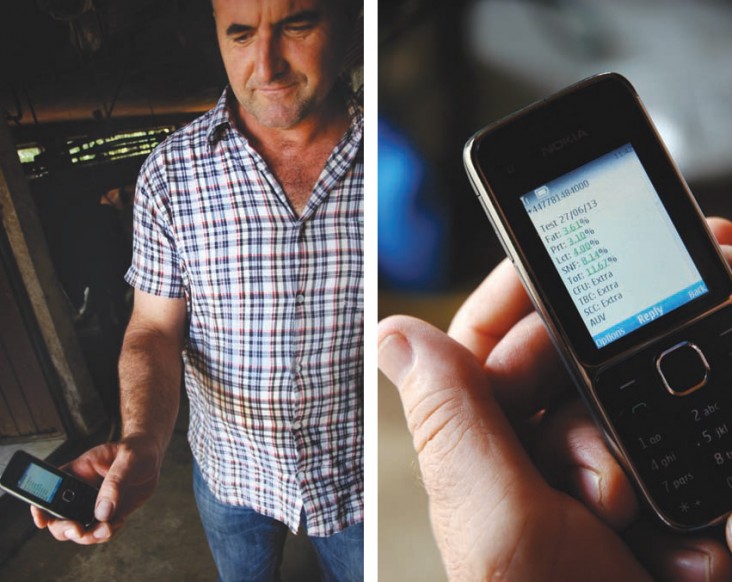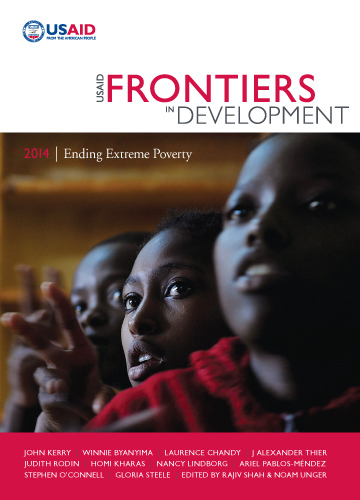Besa Ilazi and Brian Fahey
In the past, Dukagjin Dedaj, like many farmers in Kosovo, felt disconnected from the marketplace through which he sold his dairy products. The local processor that bought the raw milk from his cows often disputed its quality, and the lack of a transparent information source to suggest otherwise left Dedaj and other dairy producers at a distinct disadvantage for receiving adequate compensation for their milk.
Frustrated farmers often resorted to selling the raw milk their farms produced outside of regular—and regulated—channels. Frequently, they hawked unpasteurized and poorly packaged product by the roadside. This significantly inhibited the ability of farmers to expand their dairy herds and improve their incomes. Additionally, this sapped consumer confidence in the quality of domestically produced dairy products and constrained growth in Kosovo’s dairy processing sector. As a consequence, imports dominated the marketplace.
To address this constraint, USAID established an integrated program to strengthen the linkages between dairy farmers and dairy processors. This integrated program included targeted technical assistance on-site at farms, development of an unbiased milk testing system and use of SMS messaging to share test results.

In Kosovo, as in many developing economies, the agricultural sector fails to reach its full potential as a driver of growth. The manifold reasons include poor infrastructure, low productivity and limited access to markets. These constraints are particularly acute for operators of small farms in the most remote rural areas, who are often among the poorest of the poor.
Technical assistance may target each facet of the problem individually. A technological solution, however, can incentivize across-the-board positive change.
In this situation, technology enabled a positive feedback loop that gave actors within the agricultural sector—producers and processors—affordable access to the timely, relevant information they required to respond proactively for their businesses.
The text-messaging platform, which in this case disseminated test results for raw milk from a centralized laboratory, has been used in other development projects to share market price, weather and health information. In Kosovo, the technology fostered an increase in the quantity and quality of the milk produced by the nation’s dairy herds. It also spurred a variety of equally positive, knock-on effects, including improved access to credit for farmers and improved collaboration within the dairy industry. This net result augurs well for incorporating technologically enabled feedback loops into development projects.
A text message away
USAID, working with partners, established Kosovo’s national raw-milk sampling laboratory in the mid-2000s. Milk samples, collected from farms on a biweekly basis, are blinded so that their origins remain unknown to the experts conducting the testing. This eliminates the potential for bias and increases confidence in the results.
He always believed his cows produced excellent quality milk, but now the proof is in his pocket.
Initially, farmers received the results from field officers or through a password-protected website, also developed by USAID. However, many owners of small farms do not have immediate access to a computer, which means that they could only receive test results in the form of paper printouts delivered by field officers and milk collection agents. This led to time delays that hindered the effectiveness of the program.
To provide more immediate access to test results, USAID engaged a local IT company to develop software for disseminating test results by SMS—a development that enabled the program to finally reach its full potential. Now, roughly 1,700 Kosovo dairy farmers, including those with only a few cows, receive their milk test results on their phones twice a month.
SMS messaging has resulted in Dedaj increasing his dairy herd from 15 to 52 cows and significantly improving his family’s livelihood. He always believed his cows produced excellent quality milk, but now the proof is in his pocket. Pulling out his mobile phone one recent morning, Dedaj showed off an SMS message received from a state laboratory. It concisely measured his cows’ raw milk against eight standardized parameters, including percentages of fat, protein and sugar.
The SMS message graded Dedaj’s milk as “extra class,” a classification that allows him to command premium prices for the 720 liters of milk his cows produce each day. It also earns him a government subvention earmarked to increase the domestic supply of the highest grades of raw milk.
“This is the biggest thing USAID has done for farmers,” Dedaj said. He and other farmers receive testing results just days after their milk has been sampled, and purchasing dairies gain access to the same information. The two parties then use the results to set wholesale prices for the raw milk.
“We no longer argue about quality—that’s a third party’s job to determine now. All we talk about is price,” Dedaj said.
Prompt information means better products
The SMS test results also allow Dedaj and other farmers to respond more quickly to any deficiencies in their raw milk. For example, a decrease in the milk’s butterfat content would prompt an adjustment of the cows’ feed regimen, perhaps by mixing in more soybean meal.
Recently, Dedaj received a message indicating that his cows’ milk had slipped a grade.
“I immediately checked every cow. Which one had contributed to the slip in quality? I had to find the reason,” Dedaj said.
Testing revealed one of his cows had mastitis in one of its teats. This infection eventually leads to inflammation; however, it would not have been detected at such an early stage had Dedaj not been alerted by the SMS notification.
“It’s a miracle. I am sitting at home, and a message shows up and tells me about the health of my cows,” Dedaj said.
Improving access to credit
The milk testing program resulted in more consistent, predictable and constructive relationships between farmers and dairy processors. Farmers, armed with information, felt confident in the quantity and quality of their cows’ milk and therefore sought to expand their dairy herds. However, many still faced difficulties accessing the bank credit to do so.
Backed by the SMS test results, Kosovo’s farmers could make a stronger case for increased lending. Yet banks failed to respond, mostly due to a lack of competition and general unfamiliarity with lending to the agricultural sector. The situation left the owners of small farms with limited means for adding cows, improving their barns and purchasing necessary equipment, like cooling tanks.
To address this constraint, USAID established a Development Credit Authority (DCA) guarantee funded by the Government of Kosovo. This was the first DCA guarantee of its kind to be funded by a foreign government, demonstrating a high degree of confidence and collaboration between the Government of Kosovo and USAID.1
The credit access project involves six banks and provides a 50 percent guarantee for up to $26 million in agricultural loans2. To foster healthy competition, USAID only allocates half of the guarantee up front. Future allocations of the remaining guarantee are awarded to the banks that lend most aggressively to rural farmers. This is measured by metrics such as interest rates and collateral requirements, which often are the two biggest impediments farmers face in borrowing.
The DCA guarantee is permanently changing banking behavior.3 Banks now are hiring and training dedicated agro-lending experts who understand how to structure loans to the agricultural sector. One bank has even utilized the DCA guarantee to establish an agro-lending card. This enables the owners of small farms to purchase necessary inputs, such as small-scale equipment, with extended grace terms linked to the agricultural season.
Expanding farms, growing relationships
The improvements in milk output and quality catalyzed by the SMS system have also helped foster constructive working relationships between ethnic groups in Kosovo who share a long and often bitter history of conflict. This divide is evident even in rural areas immediately outside Kosovo’s capital of Pristina, where village populations often are segmented by ethnicity. Fostering business linkages among opposing ethnic groups is often the first step to healing these deep divisions.
In Grac˘anica/Graçanicë, a Kosovo Serb majority area a 20-minute drive from the capital, the owners of small dairy farms used the SMS messages in their efforts to seek bank financing and expand their dairy herds. They also used the SMS system to seek new sales outlets. The Serb farmers used technical and marketing advice from USAID’s agricultural support project to connect with a Kosovo Albanian dairy processor in nearby Miradi e Epërme/Gornje Dobrevo. This processor now uses the raw milk it purchases in pasteurized fluid milk, cheese and yogurts sold in supermarkets across the country.
Implications
The SMS program proved an important catalyst for economic growth within Kosovo’s dairy industry. By combining high-tech testing with a relatively low-tech and inexpensive means of dissemination, it puts information within reach of even the poorest of Kosovo’s farmers. It applies to industries everywhere that rely on rapid, consistent, low-cost provision of quality information to incentivize assertive action. Moreover, the positive associations it engendered—evidenced in all players’ feedback—should ensure its continued operation, which is key in empowering the beneficiaries of development assistance to take control of their futures.
Due to the SMS program’s success, the agricultural community is generating ideas about further applications. For example, members of the dairy sector are now in discussion with USAID to develop an SMS system that would advise dairy farmers about the feed formulation that is critical to achieving high milk production. With this system, which is in the early design stage, farmers input information related to forages, milk quality and anticipated yields. The system then returns messages about the right balance of rations and feed mix for achieving optimal milk production.
USAID and the agricultural sector are also exploring ways to use SMS messaging to link rural farmers with a network of agricultural experts to ask questions and receive immediate advisory services. Although these developments depend upon widespread cell phone coverage, they are an encouraging sign that technological advancements, such as SMS messaging, are helping optimize complementary development efforts elsewhere in the agricultural sector.
Besa Ilazi is a project management specialist and Brian Fahey is a senior private sector adviser with USAID’s Kosovo mission. The views expressed in this essay are their own and do not necessarily represent the views of the United States Agency for International Development or the United States Government.
1 While USAID typically funds DCAs, this DCA was funded through the Government of Kosovo. A few years earlier, USAID established and funded a DCA with one bank in Kosovo to encourage increased lending.
It was so successful that the Government of Kosovo expressed a desire to duplicate the DCA but did not have sufficient funds to establish its own stand-alone credit guarantee program. By collaborating with USAID, the Government of Kosovo made funds available to USAID to fund a much larger credit access program through the DCA mechanism.
2 DCA agreement signed in September 2012.
3 Kosovo DCA Assessment Report, January 2014.
Frontiers in Development
Section 3: Catalyzing Growth and Investment








Comment
Make a general inquiry or suggest an improvement.